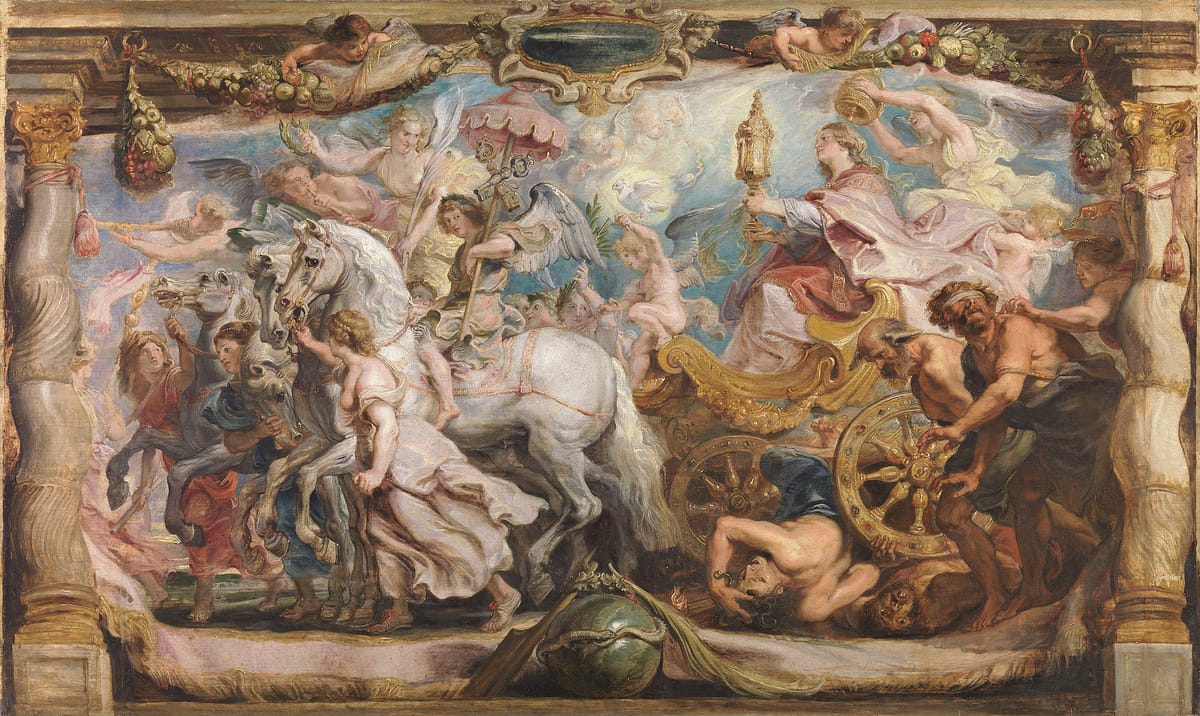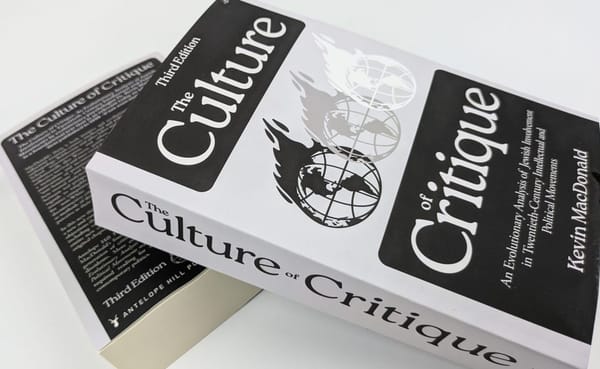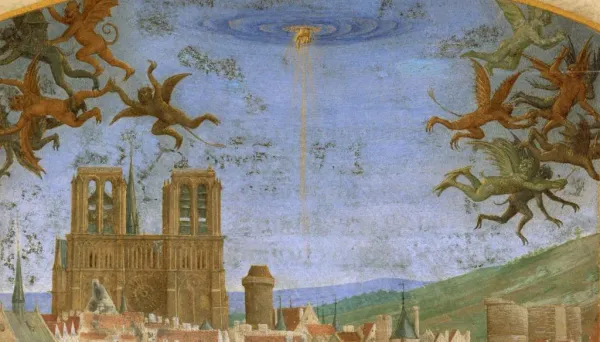The False Hope of Ecclesiocentrism
Our civilization is battling an anticulture—a hatred of our natural community and the erasure of customs and traditions that define our people—and evangelicals continue to run around, trying to solve the right problem with the wrong medicine.

In the grand scheme of Christianity’s six-thousand-year history, the debate over culture is strikingly modern. There are no church councils or creeds on the subject, yet evangelical discourse has fervently maintained its commitment to an often nebulous conception of Christian culture via the “cultural mandate.” This article is not a critique of that commitment but rather a clarifying discourse for those of us who do not thrive under the ambiguities that so often accompany it. Sometimes “Christian culture” is little more than a synonym for “church life.” In other cases, the phrase functions as a code for “American culture.” But perhaps the most frustratingly imprecise usage is when it is used to mean both things at the same time. Is this a grave category error affecting the corporeal and incorporeal kingdoms? Or is it merely a casual euphemism for the American Protestant identity? Without sufficient context, we may never know.
This zeal for a Christian culture, combined with its amorphous description, leaves some Christians to conclude that the church must be the epicenter of all culture. Others believe that, while the church may not be the sole arbiter of cultural influences, it nevertheless has such a crucial role in the formation of culture that a society cannot hope to find a meaningful existence outside of its influence. But it is my aim today to address these concerns and to prove that the formulation of “Christian culture” in a society is not a task exclusively reserved to the church, making it a societal question just as much as a spiritual one.
Supermajority Christianity and Gospel Witness
It is no secret that the American church has faced increased hostility over the last century. From open persecution to more subtle cultural shifts, the concept of a “negative world” aptly describes the Christian’s existence in America today. Evangelicals, by and large, remain heavily invested in the mechanisms that control culture, though they often hesitate to admit it. Still, the culture has decayed, and, true to their persona, most evangelicals saw a lack of evangelism as the problem.
“We will have a Christian culture once we have more Christians,” they concluded, adjusting the phrasing as necessary to account for the fake Christians and nominal saints. “To produce a truly Christian culture, we need more REAL Christians!” The game plan involved gaining a supermajority in the surrounding culture, and then, once the majority were the kind of people you could “get along with,” the cultural transformation would occur, though no one really knew what that would entail. On the surface, the plan seemed crude and unfinished, but the average evangelical held it so strongly that it must have been a conviction based on anecdotal experience; they had seen this phenomenon firsthand. They spoke with such confidence because they had actually experienced that agreeable Christian culture, perhaps not at a civilizational scale, but at a microscopic level.
Where had they seen this? At their local church.
The supermajority game plan attracted more and more bizarre theories of culture and community—ideas of a “winsome Christian presence,” “missional community,” and “radical hospitality”—ideas for solving large-scale issues, patterned on the small-scale experiences of church life. However, the results simply did not meet the expectations. In some cases, the loss of Christian culture accelerated. It didn’t make sense. Were Christians not prioritizing the church as the epicenter of society? Accusations of “worldliness” and “consumerism” circulated from the pulpits. Spiritual problems ran rampant in the world, and some began to wonder if the church itself was losing its savor. The numbers alone didn’t explain the situation; there must have been another factor involved. And there was. The diagnosis was there, but the right questions were not being asked.
Most Protestant theologians would affirm the church’s role in shaping Christian culture, emphasizing that Christian influence extends beyond the church’s walls. After all, how could all of Christ not affect all of life? And yet, this view is not expressed without hesitation. Using the church as the sole arbiter of temporal cultural values tasks it with far more than a spiritual mission. It was a force that cut both ways.
Evangelicals felt that they needed some kind of accepted method for handling the tension, so, over time, a large percentage of them adopted an emphasis on “witness” as the proper way to handle the dualism. Though Christ is the “pinnacle of culture himself,” the proper way of accomplishing that task was to employ “a kind of chastened transformational witness.” (N. Gray Sutanto) A delicate phrase for a delicate tension, but even this nuanced approach still leaves the power of culture in the hands of the church. It is a situation in which “witness” defines both the method and the goal. It seemed like the perfect strategy. Who, after seeing the bonds between members of a local church, could possibly deny the authenticity of the church’s community, and why, after experiencing this internal culture, would he not wish to transform his own into the same mold? Christians tried to expand their church community with more and more outreach opportunities, hoping that one day, their church would be able to define that locale. Others leaned into social justice movements and racial reconciliation ministries, hoping to enlarge their church’s witness so that it might “liberate” and “heal” the broader society into conformity. Both sought to remake the surrounding culture, and neither bothered to check if their church was even fit for such a task. In far too many instances, placing “Christ at the center of culture,” was the revolutionary dismantling of a community’s natural bonds, not the genuine reformation of those communal customs that might guide us to piety and religion.
In his famous book, Christ and Culture, H. Richard Niebuhr noted that ecclesiocentric tendencies in certain eras of Roman Catholic history had been so antagonistic to the surrounding culture that it had actually created a phenomenon that he called “Christ against culture.” The evangelical church’s infatuation with itself has led to a similar “Christ against culture” scenario here as well. With the church as his vehicle, Christ becomes the destroyer of customs, natural affections, and heritage, not the Savior of it. Witness becomes warfare, and when yet another ecclesiocentric movement goes rogue, we feel compelled to create another church-centered counterforce, create yet another supermajority, and take over the cultural wasteland it left behind.
Culture As Dominion
Before I go further, I must first address some common misconceptions. Despite many Christians embracing their theology of cultural engagement as an absolute truth passed down through church history, it seems that the “theology of culture” is a rather recent development in the grand scheme of things. As an etymological issue, it’s quite easy to see why. The word culture is derived from the Latin word colere (to cultivate), a word directly connected to themes of agriculture. It was not until the mid-to-late 19th century that the word culture was cemented as an anthropological concept. Edward Burnett Tylor, in his 1871 book Primitive Culture, defined the concept as, “That complex whole which includes knowledge, belief, art, morals, law, custom, and any other capabilities and habits acquired by man as a member of society.”
This anthropological conception of culture soon became its normative use. Everything that bound society together with all its various domains was understood to be a part of “culture.” In the hands of the evangelicals, the word was used interchangeably as a sort of “totalizing notion” for the glue that held human society together. It seemed that Christians had almost fully embraced the culture-as-worldview perspective when, a few years after the 1974 Lausanne Congress, the various meanings of “culture” were consolidated by a committee:
Culture is an integrated system of beliefs (about God or reality or ultimate meaning), of values (about what is true, good, beautiful and normative), of customs (how to behave, relate to others, talk, pray, dress, work, play, trade, farm, eat, etc.), and of institutions which express these beliefs, values and customs (government, law courts, temples or churches, family, schools, hospitals, factories, shops, unions, clubs, etc.), which binds a society together and gives it a sense of identity, dignity, security, and continuity.
It may be daunting in scope, but it is important to note that this definition still borrows heavily from the anthropological framework that makes culture what it is. “Culture” informs the bonds, identity, and norms of a society and, therefore, must be used and understood in this context. The necessity of this framing is further confirmed when we trace the history of this “theology of culture” and find that the term has been retrofitted onto what was previously called the “dominion mandate”—an essential doctrine in Christianity for understanding the purpose of humanity itself. This concept originates in Genesis 1:26–28 and is foundational to notions of dominion, governance, and the image of God. Here we see that “God gave to man, when he had made him, a dominion over the inferior creatures” (Matthew Henry) and that mankind subduing the earth is to be understood as “taking possession, and making use of it; of their tilling the land, and making it subservient to their use” (John Gill). To fill the earth and subdue it, therefore, gives us a practical direction for our societies, and, by extension, culture. In recent years, evangelicals have shifted the emphasis of this command. The “values” and “worldview” of culture became heavily emphasized, and, at times, even straining against the work of dominion itself.
Sometimes explicitly and sometimes implicitly, theologians soon found themselves using Matthew 28:18–20 as a sort of “interpretive lens” for Genesis 1:26–28. The Great Commission, as it is usually rendered, came to be understood as the real vision for society, the true path to fulfilling a prelapsarian mandate in a post-fall world. Inspired by the articulations of men like Kuyper and Bavinck, evangelicals quickly formed an entirely new hermeneutic, forging a “missional” perspective in which the invisible church, in its role as a transformer of society, would fulfill its Great Genesis Commission by infiltrating and recasting the culture with Christ at the center.
Yes, grace does restore nature. That much should be obvious. Yet my point in raising this issue is to illustrate how an anthropological question crafted exclusively through the lens of spiritual motivations distorts our understanding of the underlying dynamic. In this case, the loss of identity.
The previously cited definitions of “culture” all indicate that the term serves a significant function in uniting and defining people groups. Ethnicity, another modern term retrofitted to the Greek word ἔθνος (ethnos), relies on culture as a defining factor as it marks distinctions between people groups. It can be tempting to reduce culture to a mere “shared set of values,” which the Christian religion can then shape. Yet, given the intrinsic anthropological implications of the term, we also find that culture is indirectly used to shape Christian values. The Ordo Amoris, for example, is structured around the fact that our relation to others in our people group will inform the order of our loves toward them. So, as mankind fills the earth and subdues it, the culture formed by the dominion mandate inherently shapes not just nature, but also dictates how grace will restore nature.
This particular bit of nuance has been suspiciously absent from the modern discourse. Even authors and theologians who are able to see the problem often find themselves unable (or unwilling) to see the obvious solution. In his book, The Rise and Triumph of the Modern Self, Carl Trueman fights back against the latest stages of the sexual revolution happening in our time. He claims that the modern self is the product of a culture of expressive individualism, divorced from traditional notions of community and belonging. In a world where “the nation-state no longer provides identity” and where “decades of being told in the West that patriotism is bad have taken their toll on the social imaginary,” Trueman finds himself lamenting the rise of an “anticulture”—the antihistorical values of deathwork and the rejection of a given heritage. The LGBT+ community, insofar as it represented a tangible community, filled (in part) the void of identity and belonging that had been slowly eaten away by modernity. Unfortunately, the solution that Trueman proposes seems to function as a mere half-answer. “Our moral consciousness is very much shaped by our community.” He wrote, “And for this reason, the church needs to be a strong community” (Modern Self, p. 451). But how can even the strongest church community possibly hope to fill the void left in a destabilized, deracinated nation?
Though they can see the issue right before their eyes, it seems that evangelicals, so dedicated to an ecclesiocentric vision for culture, have become blind to any external dynamics in this equation. My thesis, that the formulation of “Christian culture” in a society is not a task exclusively reserved to the church, is not a call for secularism, nor does it denigrate the church’s role in the community. The future is not a zero-sum game. Instead, what I am saying is that we are so quick to diagnose the symptoms of a spiritual disease that we miss the underlying diagnosis in reality. Our civilization is battling an anticulture—a hatred of our natural community and the erasure of customs and traditions that define our people—and evangelicals continue to run around, trying to solve the right problem with the wrong medicine. They prescribe more and more “values,” hoping that the garden will simply cultivate itself. In some cases, the church has even managed to become part of the problem. We lament the divisions and disunity in our culture, then “Christianize” the multiethnic anticulture that razes our heritage. We universalize our local churches, hoping to recapture the religious glue that once held us together, yet acting in ways that alienate the very blood and soil from which it grows. We avoid culture wars to protect our witness, then watch in apathy as the local essence of our church is stripped away before our eyes. Like the transgressive eras of the Roman Catholic Church, evangelicals have managed to pit Christ against culture, even as they place him in the center.





